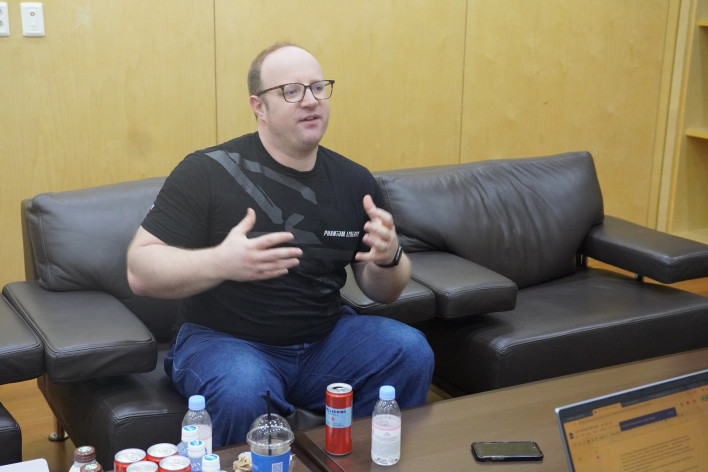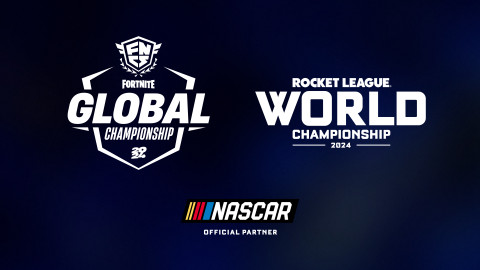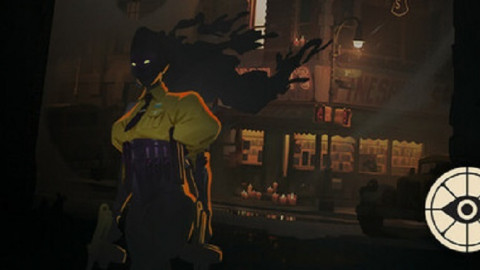
Inven Global had the chance to talk with Colin Walder, a gaming industry veteran, to discuss CD PROJEKT RED's transformation and the shift towards purposeful leadership. He reflects on the challenges of remote work and values alignment in hiring, emphasizing the impact of leadership principles and core values.
In his IGC talk, Colin shares his expertise in audio in game development and highlights the growing importance of audio quality. He also mentions the role of artificial intelligence in game development, emphasizing ethics and its potential to enhance creativity and productivity.
In your talk you spoke about about implementing leadership and teamwork principles into your company. You’re a veteran of the gaming industry — how would you contrast environments you’ve worked in with these principles to companies without?
The biggest difference now is the purposeful attention towards leadership and management. Early in my career, these roles were typically filled by the most experienced engineers. It wasn't something people necessarily aspired to; it just happened with seniority, often treated as a side responsibility.
Previously, you might have a manager who was genuinely interested and invested in management, but it wasn't a standard practice. Now, we're dedicating time and effort to this aspect. As an engineering director, a significant part of my job is to bring purpose to our management practices. We're constantly asking, "How can we improve? How can we create a better team culture?"
This proactive approach is something our HR department appreciates. Traditionally, people assume this is HR's domain, not something for developers to worry about. But in our case, we're the ones initiating new programs and pushing HR to help us implement them.
Regarding the gaming industry, the shift towards a digital environment, especially with more remote work, presents challenges. Communication goes beyond just voice; body language and physical presence are important for connection. The move to remote work offers benefits, like increased focus and comfort at home, which is especially helpful for those with children or other responsibilities. However, it's easy to lose that personal connection and rapport you naturally build when physically together.
I recall times in my career when we were launching games, and everyone in the studio felt that collective energy. It's difficult to replicate that in a remote setting. Despite the push for remote work, we shouldn't overlook the collaborative benefits of being in the same space. It's essential to find a balance.
Your talk mentioned a very stringent hiring process — obviously, people that don't buy into your mission will slip through the cracks. How do you go about ameliorating this situation?
This is a continuous process, starting with the hiring stage. Here, we try to evaluate candidates to see if they're a fit for our team, but we're also open and transparent about who we are. In every interview, I go through our values in more detail than I did today, giving examples of how these work or don't work in practice. I tell them, if these values excite you, join us if we extend an offer. But if not, it's best for both sides if they decline our offer, should we make one.
But that's just the beginning; we need to continually revisit and reinforce these values. There are things we might miss in the hiring process, especially now that we're doing all our hiring remotely due to the pandemic, instead of the onsite interviews we used to conduct more often.
Following this, there's usually a trial period where new hires come in, and we see how things work in practice. Then comes continuous evaluation, working with the managers. It's crucial to have engineering managers focused on people's development. They're trained in skills like acknowledging people, giving proper feedback, creating development plans, and they're mandated to spend time on that.
This contributes to our longer-term vision of how to grow and develop this culture over time.
A big portion of your talk was about Cyberpunk 2077's release — talk a bit about the atmosphere of the company before the game's release. Did your team know there were issues?
It's always tough, you know, in the workplace, to see everything. So, you know, we go through these stages, we had these series of demos, 2018, 2019, the E3 demos, and then the 2020 release. Every time we delivered something, it was intense. It was always like, "Okay, how are we going to do this?" And then, somehow, we achieved that.
This isn't just something that happened at CD Projekt; it's been throughout my whole career. There's this pattern, you know, when you've done it so many times, it's hard to have that clear vision until you're really, really up close. So, it's kind of tough to speak with perfect clarity. No one can predict everything that's going to happen until it actually happens, and then you can see it, right? Then you can really face it, and hindsight is always better for being able to say, "Okay, this went wrong because of XYZ, so let's make some changes."
Besides the changes in how the company was structured, were there any other big lessons learned?

This approach we had, the way we were working production-wise, creating demos, and moving towards an agile mindset and workflow—it's about ensuring we're on top of certain things from the start. Take consoles, for example; we need to make sure they're functioning from the get-go. For our next project, Polaris, we're already running our demos and internal reviews on the console from the very beginning. This is a step we only took later in Cyberpunk's development.
Regarding other tools or strategies for maintaining morale post-release, especially after the difficulties we faced—it was indeed a challenge. The morale took a significant hit; that's clear. The crucial thing was to acknowledge what happened. We had to admit that the outcome wasn't what we'd hoped for and that we were determined to change things. But it's one thing to say it; it has to be put into practice, you know? Actions speak louder than words.
You've got to demonstrate commitment. For instance, when a deadline is looming, instead of reverting to crunch, we might say, "Let's adjust the schedule," or, "Let's approach this differently." Once this becomes a repeated behavior—once the team sees a genuine effort to prevent crunch—that's when trust and morale start to rebuild. People need to see it to believe it.
How do you think your company leadership cultivation has affected you on a personal level?
Yeah, my coach actually called me out on this recently during a discussion about personal values. I've been really zeroed in on these values, their implementation within the team, you know? I dive deep into these values, they matter to me, personally. But I've realized I need more, something beyond just living by the company or team values. I need that personal, independent aspect.
Work is such a massive part of our lives, right? If we make the right choices, land in the right company where there's significant overlap between our personal core values and the company's, that's where natural development happens. I've experienced it myself, especially with practical aspects like 'extreme ownership.' It's about questioning whether I'm really taking ownership in personal situations or just pointing fingers, which isn't what extreme ownership is about. It's about seeking solutions, not assigning blame.
This extends to our value of being 'smart with people.' Improving communication skills naturally spills over into everything else. Take negotiation tactics, for instance. I'm really into the Black Swan Group, these ex-FBI negotiators. There's something about leadership insights from hardcore disciplines that just clicks with us. Their negotiation techniques are so applicable in daily life because it's all about effective communication, really getting to the heart of matters.
But to truly integrate these skills, you've got to practice them daily. It's a constant process of figuring out how to better connect, understand others, and enhance those communication skills.
Let's talk a bit about your expertise in audio to wrap up. How do you think the evolution of audio quality in games has changed over time over your tenure with CD Projekt RED?
Throughout my career, I've witnessed this evolution. Actually, it's been over 17 years, almost 18 now, since I started—right around the time the PS3 and Xbox 360 were emerging. That's when the gaming industry started aspiring for what we might term "cinematic quality." There was this push for higher standards, especially in audio, an area that had been, let's say, somewhat overlooked in the past. We craved richer fidelity, more intricacy, and increased interactivity in sound.
This shift has been incredibly beneficial for my career. My longstanding passion for audio, which predates my involvement in gaming, coupled with my technical skills as a programmer, really set the stage for me. And this trend has only grown over time. There's been increased investment in audio programmers—those tasked with developing bespoke technology that allows for more dynamic, focused sound.
It's evident even in game reviews nowadays; critics frequently remark on the audio quality. In the past, it was a rarity—you might find a single mention of a sound effect in one out of a hundred reviews. But now, it's clear that people care about it. They want high-quality music, impactful sound effects, and well-executed, professionally performed voiceovers.
I take great pride in this aspect, especially the work our localization team did on the voiceovers. You see this emphasis more and more in AAA games—truly stellar performances. Take Idris Elba in "Phantom Liberty," for example—he absolutely crushed it. The reviews reflect that. People genuinely value high-quality audio—it adds so much to the experience.

Look at the radio stations we incorporated, including the community radio station. There's a growing acknowledgment and appreciation for top-notch audio in games, and it's incredibly gratifying to witness.
Can you discuss a moment in any of the projects you've worked on where the audio or score played a pivotal role in the storytelling or player experience, something that perhaps the average gamer might not have noticed?
Absolutely, the subtlety of sound design is something that often escapes the immediate notice of the average gamer. Sound, both in movies and games, bears this unique curse: when it's done exceptionally well, it tends to go unnoticed. Audio seamlessly underpins our experiences, constantly present, constantly shaping our emotions and perceptions. We never "blink" our ears; our auditory processing never inherently pauses, unlike our visual focus, which is periodically interrupted by blinking. This constant stream makes sound a subtly influential force.
When we excel in our sound design, the cues are often subliminal. For instance, a common indicator I look for in reviews or comments is when someone mentions how a gun "feels" powerful. They might not explicitly recognize it, but they're partially referring to the sound. It's an aspect of the experience that they've internalized, even if they can't specifically pinpoint it.
In "The Witcher 3: Blood and Wine," for example, I take immense pride in how we choreographed some of the boss encounters, like those with the Goliath and Dettlaff. We synchronized their attacks with the musical score in a subtle manner, not overtly pronounced, but purposefully timed to enhance the cinematic quality. When a monster launched a significant attack, it would coincidentally land on a beat, creating this intrinsic connection between action and sound.
This organic, cinematic sensation was also present in "Cyberpunk 2077," during moments where we blended diegetic and non-diegetic sounds. In one scene, the sound emanating from club speakers would seamlessly morph into the score, a subtle yet profoundly cinematic technique. It's an approach long utilized by skilled sound designers, composers, and audio editors in film to guide the audience's emotions, and now we're starting to apply these techniques interactively, which, I believe, holds even greater potential.

Imagine harnessing these methods that so profoundly influence emotion and perception, and then implementing them in an interactive format. The prospects are immensely exciting. This intersection of art and technology in sound design doesn't just enhance the narrative; it shapes the entire experiential landscape of gaming.
Many games are adopting AI-driven experiences, procedural generation, and other advanced technologies. What is your perspective on the use of artificial intelligence in game development — on the audio front — and how do you envision it shaping the future of gaming?
Absolutely, the integration of technology in audio design, particularly in voice generation, is advancing significantly, and it's fascinating to see these developments. Audio departments indeed tend to be ahead of the curve, innovating with technologies that may initially have been designed for other purposes.
Using text-to-speech engines like Google Voice for placeholder dialogue in development is a smart application, allowing teams to experience scenes in a more complete sense before the final voice recordings are done. The quality of these generated voices is improving steadily, opening up new possibilities. While it's unlikely they'll replace main character voices soon, there's potential for secondary or minor roles, especially in games with expansive worlds requiring a vast array of characters.
The ethical considerations are paramount, especially with technology capable of replicating human voices. The example you provided from Cyberpunk, where technology was used to include a beloved Polish actor who had sadly passed away, is touching. It underscores the importance of handling such situations with utmost respect and sensitivity, ensuring it's not exploitative and honors the individual's memory. Similar cases, like involving an actor who couldn't perform due to health issues, highlight the technology's potential to be inclusive in a respectful manner.
As seen in projects like "Top Gun: Maverick" and "The Mandalorian," this technology is gradually gaining ground in mainstream media. However, its application must always be ethical and considerate of the implications, particularly when representing someone who can no longer give their consent.
Looking ahead, the impact of technology isn't just about content creation; it's also about enhancing productivity and streamlining processes for developers. This is more than just a tool for efficiency; it's about empowering creative individuals to realize their visions more freely, without getting bogged down in technical minutiae. While the market is still exploring these technologies, their potential is undeniable, and they're certainly an area worth attention and thoughtful consideration as we move forward.
This interview was condensed and edited for length and clarity.
-

I write. I rap. I run. That’s pretty much it.
Sort by:
Comments :0





